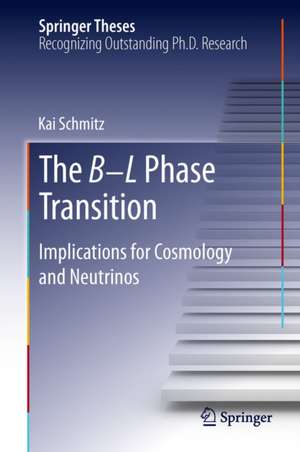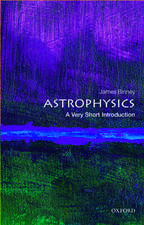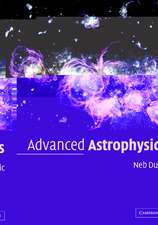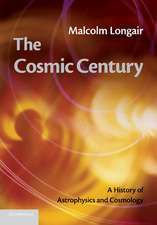The B−L Phase Transition: Implications for Cosmology and Neutrinos: Springer Theses
Autor Kai Schmitzen Limba Engleză Hardback – 14 noi 2013
| Toate formatele și edițiile | Preț | Express |
|---|---|---|
| Paperback (1) | 637.46 lei 43-57 zile | |
| Springer International Publishing – 27 aug 2016 | 637.46 lei 43-57 zile | |
| Hardback (1) | 643.65 lei 43-57 zile | |
| Springer International Publishing – 14 noi 2013 | 643.65 lei 43-57 zile |
Din seria Springer Theses
- 18%
 Preț: 997.88 lei
Preț: 997.88 lei -
 Preț: 389.88 lei
Preț: 389.88 lei - 15%
 Preț: 646.94 lei
Preț: 646.94 lei - 18%
 Preț: 943.43 lei
Preț: 943.43 lei -
 Preț: 399.29 lei
Preț: 399.29 lei - 18%
 Preț: 944.99 lei
Preț: 944.99 lei - 15%
 Preț: 636.80 lei
Preț: 636.80 lei - 18%
 Preț: 941.05 lei
Preț: 941.05 lei - 15%
 Preț: 643.16 lei
Preț: 643.16 lei - 15%
 Preț: 642.68 lei
Preț: 642.68 lei - 18%
 Preț: 1103.62 lei
Preț: 1103.62 lei - 20%
 Preț: 558.82 lei
Preț: 558.82 lei - 18%
 Preț: 1112.30 lei
Preț: 1112.30 lei - 18%
 Preț: 944.19 lei
Preț: 944.19 lei - 18%
 Preț: 1109.92 lei
Preț: 1109.92 lei - 18%
 Preț: 1217.27 lei
Preț: 1217.27 lei - 15%
 Preț: 640.06 lei
Preț: 640.06 lei - 15%
 Preț: 636.45 lei
Preț: 636.45 lei - 15%
 Preț: 640.06 lei
Preț: 640.06 lei - 15%
 Preț: 640.88 lei
Preț: 640.88 lei -
 Preț: 389.70 lei
Preț: 389.70 lei - 20%
 Preț: 563.89 lei
Preț: 563.89 lei -
 Preț: 393.35 lei
Preț: 393.35 lei - 15%
 Preț: 637.93 lei
Preț: 637.93 lei - 15%
 Preț: 641.85 lei
Preț: 641.85 lei - 18%
 Preț: 1225.94 lei
Preț: 1225.94 lei - 20%
 Preț: 551.36 lei
Preț: 551.36 lei - 18%
 Preț: 1229.10 lei
Preț: 1229.10 lei - 15%
 Preț: 639.25 lei
Preț: 639.25 lei - 18%
 Preț: 999.45 lei
Preț: 999.45 lei - 15%
 Preț: 640.06 lei
Preț: 640.06 lei - 18%
 Preț: 1220.45 lei
Preț: 1220.45 lei - 18%
 Preț: 1116.26 lei
Preț: 1116.26 lei - 18%
 Preț: 1110.72 lei
Preț: 1110.72 lei - 18%
 Preț: 1000.87 lei
Preț: 1000.87 lei - 18%
 Preț: 891.17 lei
Preț: 891.17 lei - 15%
 Preț: 640.06 lei
Preț: 640.06 lei - 5%
 Preț: 1154.07 lei
Preț: 1154.07 lei - 15%
 Preț: 635.96 lei
Preț: 635.96 lei - 15%
 Preț: 640.88 lei
Preț: 640.88 lei -
 Preț: 387.20 lei
Preț: 387.20 lei - 18%
 Preț: 1109.92 lei
Preț: 1109.92 lei -
 Preț: 385.25 lei
Preț: 385.25 lei -
 Preț: 385.25 lei
Preț: 385.25 lei - 18%
 Preț: 1112.30 lei
Preț: 1112.30 lei - 18%
 Preț: 999.45 lei
Preț: 999.45 lei -
 Preț: 386.99 lei
Preț: 386.99 lei - 15%
 Preț: 637.13 lei
Preț: 637.13 lei - 20%
 Preț: 554.20 lei
Preț: 554.20 lei - 20%
 Preț: 555.57 lei
Preț: 555.57 lei
Preț: 643.65 lei
Preț vechi: 757.24 lei
-15% Nou
Puncte Express: 965
Preț estimativ în valută:
123.16€ • 128.94$ • 101.91£
123.16€ • 128.94$ • 101.91£
Carte tipărită la comandă
Livrare economică 07-21 aprilie
Preluare comenzi: 021 569.72.76
Specificații
ISBN-13: 9783319009629
ISBN-10: 3319009621
Pagini: 220
Ilustrații: XIII, 221 p. 19 illus., 10 illus. in color.
Dimensiuni: 155 x 235 x 22 mm
Greutate: 0.51 kg
Ediția:2014
Editura: Springer International Publishing
Colecția Springer
Seria Springer Theses
Locul publicării:Cham, Switzerland
ISBN-10: 3319009621
Pagini: 220
Ilustrații: XIII, 221 p. 19 illus., 10 illus. in color.
Dimensiuni: 155 x 235 x 22 mm
Greutate: 0.51 kg
Ediția:2014
Editura: Springer International Publishing
Colecția Springer
Seria Springer Theses
Locul publicării:Cham, Switzerland
Public țintă
ResearchCuprins
Early Universe Cosmology.- Framework for a Consistent Cosmology.- Neutrino Phenomenology.- Supersymmetric Abelian Higgs Model.- Nonperturbative Dynamics.- The Reheating Process.- WIMP Dark Matter from Heavy Gravitino Decays.
Textul de pe ultima copertă
Several of the very foundations of the cosmological standard model — the baryon asymmetry of the universe, dark matter, and the origin of the hot big bang itself — still call for an explanation from the perspective of fundamental physics. This work advocates one intriguing possibility for a consistent cosmology that fills in the theoretical gaps while being fully in accordance with the observational data. At very high energies, the universe might have been in a false vacuum state that preserved B-L, the difference between the baryon number B and the lepton number L as a local symmetry. In this state, the universe experienced a stage of hybrid inflation that only ended when the false vacuum became unstable and decayed, in the course of a waterfall transition, into a phase with spontaneously broken B-L symmetry. This B-L Phase Transition was accompanied by tachyonic preheating that transferred almost the entire energy of the false vacuum into a gas of B-L Higgs bosons, which in turn decayed into heavy Majorana neutrinos.
Eventually, these neutrinos decayed into massless radiation, thereby producing the entropy of the hot big bang, generating the baryon asymmetry of the universe via the leptogenesis mechanism and setting the stage for the production of dark matter. Next to a variety of conceptual novelties and phenomenological predictions, the main achievement of the thesis is hence the fascinating notion that the leading role in the first act of our universe might have actually been played by neutrinos.
Eventually, these neutrinos decayed into massless radiation, thereby producing the entropy of the hot big bang, generating the baryon asymmetry of the universe via the leptogenesis mechanism and setting the stage for the production of dark matter. Next to a variety of conceptual novelties and phenomenological predictions, the main achievement of the thesis is hence the fascinating notion that the leading role in the first act of our universe might have actually been played by neutrinos.
Caracteristici
Nominated as an outstanding Ph.D. thesis by the Deutsches Elektronen-Synchrotron (DESY), Hamburg, Germany Offers a consistent and testable picture of the origin of the hot early universe Presents a detailed and time-resolved description of the reheating process after inflation Includes an extensive introduction to early universe cosmology, accessible to non-specialists Includes supplementary material: sn.pub/extras












